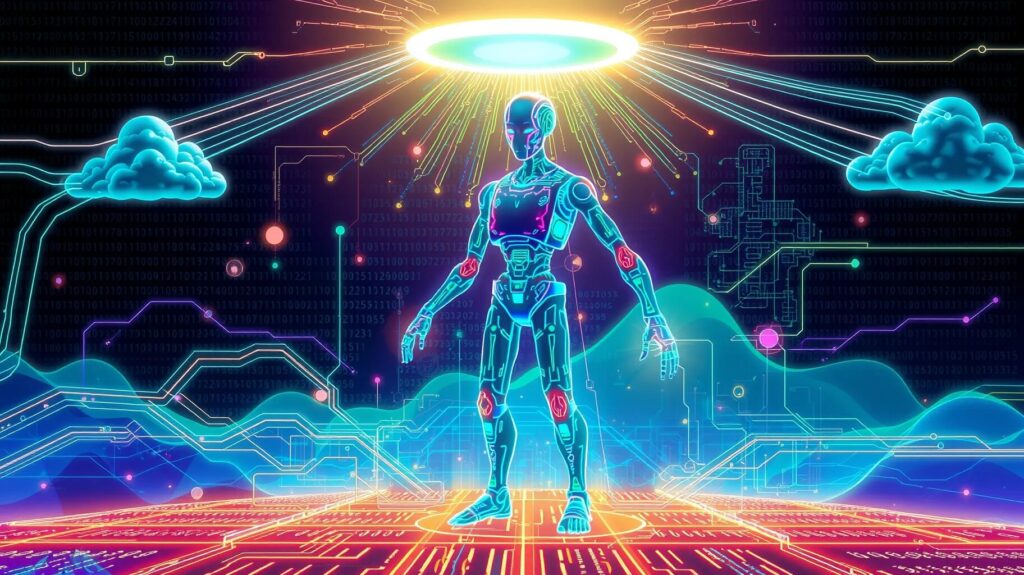
Every passing year, it feels like the technology is pushing the boundaries of what we thought possible. Now, we’re standing at the edge of a new horizon. Sam Altman, the CEO of OpenAI, recently made waves by stating that the next generation of AI could be powerful enough to invent breakthroughs, and maybe even cure diseases. This isn’t just sci-fi anymore—it’s rapidly becoming our future reality.
A Self-Upgrading AI?
ChatGPT, known globally for its conversational prowess, is evolving. The next generation of AI won’t just perform tasks we give it, it could begin upgrading itself. Imagine AI systems that learn not just from their inputs, but also from their own improvements, optimizing themselves in real-time to become more efficient and powerful.
This type of “self-learning” AI could lead to exponential growth in its capabilities. We’re talking about technology that can identify gaps in its knowledge, develop new algorithms, and possibly surpass human-level intelligence in specific areas. It could become a “meta-researcher”, discovering novel solutions to problems in ways we can’t predict.
AI-Powered Breakthroughs
Altman’s vision for next-gen AI includes the creation of groundbreaking innovations. The future AI models could potentially design new materials, discover energy-efficient technologies, and even propose new theories in physics. These aren’t just incremental changes—they’re leaps in innovation that could transform industries overnight.
Think about how long it takes to develop a new drug today. Years, if not decades, of trial and error are required to find compounds that work, often involving extensive lab testing and clinical trials. But what if AI could streamline this process? By simulating millions of experiments in a fraction of the time, AI could pinpoint effective treatments faster than any human researcher.
AI in the Fight Against Disease
One of the most exciting aspects of next-gen AI is its potential to cure diseases. Medical researchers have already started using AI to analyze patterns in complex biological data, but Altman believes this is only the beginning. The AI of tomorrow could map out the human genome more intricately, uncovering hidden connections between genetic mutations and diseases that have long eluded scientists.
AI’s deep learning capabilities could lead to cures for diseases that have stumped medical researchers for years—cancers, rare genetic disorders, and even neurodegenerative conditions like Alzheimer’s. By processing vast amounts of biological data faster and more accurately than any human could, AI has the potential to revolutionize healthcare.
Consider the possibility of personalized medicine becoming a reality. With AI, we could tailor treatments to individual patients based on their specific genetic makeup, leading to more effective therapies and better outcomes. This wouldn’t just cure diseases—it could change the entire healthcare landscape.
Ethical Concerns and Responsible AI Development
While the potential of next-gen AI is undeniably exciting, it also raises important ethical questions. How do we ensure that self-improving AI is developed responsibly? What happens if AI systems become so advanced that they outpace our ability to understand or control them?
Altman himself has acknowledged these concerns. OpenAI’s mission is not just to create powerful AI but to do so ethically and with consideration for its impact on society. Safeguards will need to be built into these systems, ensuring that as AI evolves, it remains aligned with human values.
Regulation and oversight are key. As AI becomes more autonomous, international cooperation will be essential to establish guidelines on its use, particularly in sensitive fields like medicine, defense, and finance.
A New Era of Innovation
Sam Altman’s vision for AI is clear: it’s not just about creating a tool to assist us; it’s about ushering in a new era of innovation. A self-upgrading AI system has the potential to invent solutions to the problems that have held humanity back for centuries. From climate change to global pandemics, AI could play a central role in crafting solutions we never thought possible.
The next generation of AI might be the catalyst for a transformation unlike any we’ve seen before. Whether it’s designing new cancer treatments, solving the mysteries of the universe, or creating breakthroughs in renewable energy, AI could be our partner in navigating the challenges of tomorrow.
However, with all this potential comes great responsibility. As Altman suggests, we need to proceed with caution, ensuring that the benefits of AI are shared widely and equitably, and that we build systems we can trust as they evolve.
The future of AI is no longer a distant concept—it’s already taking shape. And as ChatGPT and other AI systems continue to evolve, we might soon find ourselves living in a world shaped by their discoveries.
As Altman continues to push forward with next-gen AI, one thing is for certain: the line between human ingenuity and machine intelligence is blurring, and the possibilities are nothing short of extraordinary.
Resources
OpenAI Official Website
- Stay updated on OpenAI’s latest projects, research papers, and advancements in AI technology.
- https://www.openai.com
Sam Altman’s Blog
- Follow Sam Altman’s personal thoughts and insights on AI, innovation, and future technologies.
- https://blog.samaltman.com